

Evaluating Internet Research Sources. Robert Harris Version Date: January 21, 2015 Previous: December 27, 2013; November 6, 2013; Nov. 22, 2010 and June 15, 2007 "The central work of life is interpretation.
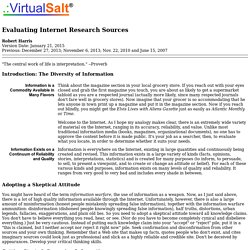
" --Proverb Introduction: The Diversity of Information Adopting a Skeptical Attitude You might have heard of the term information warfare, the use of information as a weapon. Evaluate the quality and credibility of your sources. Not all information is created equal.
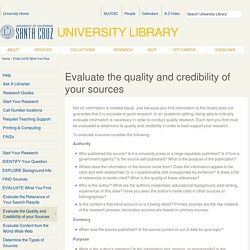
Just because you find information at the library does not guarantee that it is accurate or good research. In an academic setting, being able to critically evaluate information is necessary in order to conduct quality research. Home - Evaluating resources - Library Guides at UC Berkeley. To find out more about an author: Google the author's name or dig deeper in the library's biographical source databases.
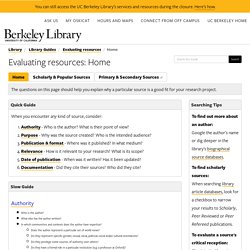
To find scholarly sources: When searching library article databases, look for a checkbox to narrow your results to Scholarly, Peer Reviewed or Peer Refereed publications. To evaluate a source's critical reception: Check in the library's book and film review databases to get a sense of how a source was received in the popular and scholarly press. To evaluate internet sources: The internet is a great place to find both scholarly and popular sources, but it's especially important to ask questions about authorship and publication when you're evaluating online resources. If it's unclear who exactly created or published certain works online, look for About pages on the site for more information, or search for exact quotations from the text in Google (using quotation marks) to see if you can find other places where the work has been published.
Evaluating Internet Sources : Olson Library. Because of the hodge-podge of information on the Internet, it is very important you develop evaluation skills to assist you in identifying quality Web pages.
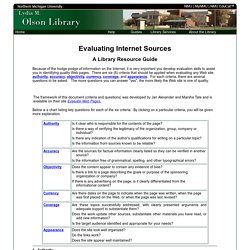
There are six (6) criteria that should be applied when evaluating any Web site: authority, accuracy, objectivity, currency, coverage, and appearance. For each criteria, there are several questions to be asked. The more questions you can answer "yes", the more likely the Web site is one of quality. Below is a chart listing key questions for each of the six criteria. By clicking on a particular criteria, you will be given more explanation. 1. A) Is it clear who is responsible for the contents of the page? Evaluating Sources of Information. Summary:

Google Search Results: Evaluating What You Find. Google’s web-page-ranking system, PageRank, tends to give priority to better respected and trusted information.
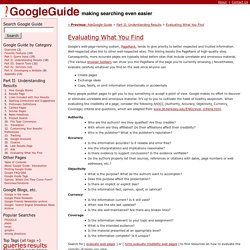
Well-respected sites link to other well-respected sites. This linking boosts the PageRank of high-quality sites. Consequently, more accurate pages are typically listed before sites that include unreliable and erroneous material. (The various browser toolbars can show you the PageRank of the page you’re currently browsing.) Finding sources for your research. How to Validate Results from a Google Web Search - dummies. By Harold Davis Part of Building Research Tools with Google For Dummies Cheat Sheet When you validate research results from a Google web search, your goal is to determine the credibility of the information you’ve discovered.
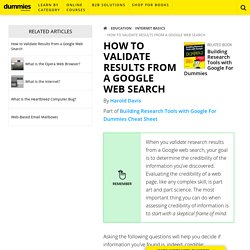
Evaluating the credibility of a web page, like any complex skill, is part art and part science. How to Search & Determine Credible Sources on the Internet. Practically anyone can create a website.

Schools, businesses, government entities, churches, and libraries create websites so people can learn more about what they do. Individuals can create personal sites or blogs to write about their families, friends, work, or any other subject. Corporations can make websites to promote their products, and political activists can publish websites to promote their cause. Anyone with an idea and Internet access can create a website and fill it with just about any content they want.
There are over 600 million active websites in the world, many of which are protected by free speech and anti-censorship laws. Choosing Credible Sources. When a writer uses a book or published article as a source in a research paper, there are not many questions to ask about the credibility of that source.
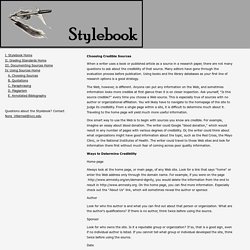
Many editors have gone through the evaluation process before publication. Using books and the library databases as your first line of research options is a good strategy. Wikipedia: How Accurate Is It? Wikipedia may represent the world's most popular online encyclopedia, but its crowd-sourced approach presents some pitfalls for the unwary.
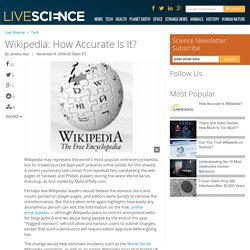
A recent cautionary tale comes from baseball fans vandalizing the wiki pages of Yankees and Phillies players during the latest World Series matchup, as first noted by MyFoxPhilly.com. Perhaps few Wikipedia readers would believe the obvious slurs and insults posted on player pages, and editors work quickly to remove the misinformation. But the incident once again highlights how easily any anonymous person can edit the information on the free, online encyclopedia — although Wikipedia plans to restrict anonymous edits for biographical entries about living people by the end of this year.
"Flagged revisions" will still allow anonymous users to submit changes, except that such submissions will require editor approval before going live. Missing or wrong information on Wikipedia could have more serious consequences.